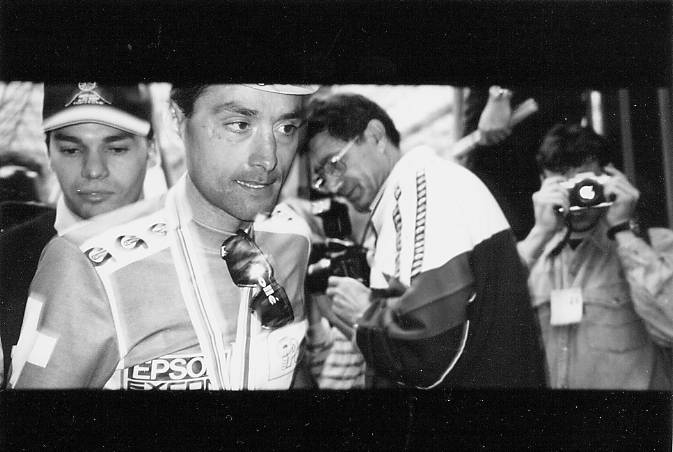Video on demand: Per un raggio di gloria
Titolo: Per un raggio di gloria
Anno: 1996
Regia: Villi Hermann
Durata: 68'
Colore: colore
Versione.: italiano
Sottotitoli:
Sinossi
ITA: Il documentario nasce dall’incontro di due progetti: quello dello stesso Hermann di filmare gli outsider dei Mondiali di ciclismo di Lugano 1996 e quello della Televisione svizzera TSI di dare l’incarico ad un cineasta di realizzare un film sul mondiale con un occhio “soggettivo”, lontano da quello delle telecronache sportive. I protagonisti non sono solo Barbara Heeb, Alex Zülle, Johan Museeuw, Tony Rominger, Andreas Kloeden, Gianluca Sironi, Dariusz Baranowskio, Mauro Gianetti, ma anche i giovani corridori polacchi che cercano nel ciclismo un’alternativa alla miniera o alla fabbrica, le giornaliste sportive che si fanno strada in un mondo finora riservato agli uomini, il personale tecnico delle squadre, come anche lo spettatore che vive l’emozione della gara da vero e proprio protagonista, spostandosi in camper da un circuito all’altro. La colonna sonora è di Christian Gilardi e Ivano Torre. I testi del poeta e scrittore Alberto Nessi, sono affidati alla lettura dell’attore Omero Antonutti.
DEU: Während den Rad-Weltmeisterschaften 1996 in Lugano habe ich zusammen mit dem Kameramann Felix von Muralt (Lookat Zürich) einen Dokumentarfilm gedreht. Für mich war dies die erste Videoproduktion. Wir wählten das Filmformat 16:9. Wir dachten also mehr ans Kino als ans Fernsehen.
Wir rannten nicht den Berühmtheiten nach, sondern hatten eine Vorliebe für Outsider, (die Vorbereitungen der Polenequipe filmten wir in der Kohlengrubengegend von Katowice und Zory). Wir versuchten hinter die Kulissen einer Rad-WM zu schauen. Aber auch die Topsportler schenkten uns gute Bilder: Babara Heeb auf der Crespera, das Duell der beiden Veloreisläufer Mauro Gianetti und Johan Museeuw, die goldig-nassen Momente von Alex Zülle und sein Sturz (übrigens waren wir die einzige Filmequipe die den ganzen Hergang aufzeichneten). Der Zuschauer bekommt die so genannten Helden der Strasse zu Gesicht: Barbara Heeb, Rasa Polikeviciute, Alex Zülle, Johan Museeuw, Tony Rominger, Giuliano Figueras, Gianluca Sironi, Roberto Sgambelluri, Andreas Kloeden, Dariusz Baranowski usw.
Wir haben Velopilgerer angetroffen, vor allem Radfans aus Italien, die noch vom Campionissimo Fausto Coppi schwärmten. Ein rares Filmdokument aus Italien für die Tifosi sieht man im Video, ein „Cinegiornale“ von der WM 1953 in Lugano, in s/w.
Die Musik zum Video komponierten zwei junge Tessiner Musiker die mit modernen Improvisationen bekannt geworden sind: Christian Gilardi (Altrisuoni) und Ivano Torre.
Für den Kommentar fragte ich meinen Freund und Poet Alberto Nessi, ob er Lust hätte diese Massensportveranstaltung zu beobachten und zu beschreiben. Unabhängig von einander erlebten wir diese Velofesttage im Tessin.
ENG: Cycling and poetry, titled a Swiss Italian newspaper. The film uses a poetic sports commentary by the famous Swiss Italian poet Alberto Nessi who likes personally cycling and his text is spoken by the well-known Italian actor Omero Antonutti. The film fellows the young polish racing team during their preparations in Poland, the very flat landscape and their arrival in the Swiss hills. But we also fellow the highly professionals from Belgium, Italy, Spain, Switzerland and others during the World championship in Lugano, Switzerland.
We do have interviews with the Spanish cook and journalist in the documentary also. The documentary shows not only the official races but also the preparations of young raiders of different teams, the training of various professional raiders, the women and men’s competitions and some little and amusing stories happening beside and during the big event.
We are the only film crew who filmed the accident of Alex Zülle when he fall down.
The documentary shows not only the winner like Barbara Heeb, Alex Zülle or Johan Museeuw, Michele Bartoli, Tony Rominger, Giuliano Figueras, Luca Sironi, Andreas Kloeden, Mauro Gianetti, but also the outsiders.
The film contains also a rare b/w flashback of the champions Fausto Coppi who won the World championship in Lugano 1953.
The music was especially composed for the documentary by two Swiss musicians, Christian Gilardi and Ivano Torre.

